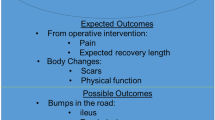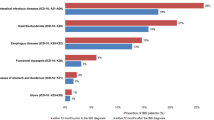Abstract
Our purpose was to evaluate the durability of the diagnosis of irritable bowel syndrome (IBS) based on clinical criteria. The study population consisted of a cohort of previously published study patients evaluated for IBS between 1989 and 1992, who met the International Congress of Gastroenterology criteria for IBS. Patients were reinterviewed for cardinal features of IBS, Rome I, Rome II, and Manning criteria 10–13 years after the initial diagnosis. During the observational follow-up period, there were 75 patients, 14 males and 61 females, with a mean age of 47.5 ± 11.3 years (SD; range, 20 to 75 years). Mean time of reinterview after initial diagnosis was 11.8 ± 0.9 years (range, 10 to 13 years). None of the 75 patients had an abdominal condition which could have been mistaken for IBS. Other abdominal conditions diagnosed during this period included diverticulitis (five), uterine fibromyoma (three), and gallbladder disease (three). Sixty-nine patients (92%) did not consider their symptoms as resolved. Thirty-five (46.7%) had repeat structural evaluation of the colon for similar symptoms without any new diagnoses made. Twenty-six (34.7%) and 32 (42.7%) presently meet the Rome II and Rome I criteria for IBS, respectively. Clinicians are advised to use clinical criteria for a specific and durable diagnosis of IBS.
Similar content being viewed by others
References
Manning AP, Thompson WG, Heaton KW, Morris AF: Towards a positive diagnosis of the irritable bowel. Br Med J 2:653-654, 1978
Drossman DA, Corazziari E, Talley NJ, et al.: Rome II: A multinational consensus document on functional gastrointestinal disorders. Gut 45 (Suppl II):1-81, 1999
Mitchell CM, Drossman DA: Survey of the AGA membership relating to patients with functional gastrointestinal disorders. Gastroenterology 92:1282-1284, 1987
Drossman DA, Whitehead WE, Camilleri M: Irritable bowel syndrome: A technical review for practice guideline development. Gastroenterology 112:2120-2137, 1997
Patel RP, Petitta A, Fogel R, Peterson E, Zarowitz BJ: The economic impact of irritable bowel syndrome in a managed care setting. J Clin Gastroenterol 3:14-20, 2002
Camilleri M, Williams DE: Economic burden of irritable bowel syndrome: Proposed strategies to control expenditures. Pharmacoeconomics 4:331-338, 2000
Camilleri M: Management of the irritable bowel syndrome. Gastroenterology 120:652-668, 2001
Lembo T, Wright RA, Bagby B, Decker C, Gordon S, Jhingran P, Carter E, Lotronex Investigator Team: Alosetron controls bowel urgency and provides global symptom improvement in women with diarrhea-predominant irritable bowel syndrome. Am J Gastroenterol 96:2662-2670, 2001
Muller-Lissner SA, Fumagalli I, Bardhan KD, et al.: Tegaserod, a 5-HT(4) receptor partial agonist, relieves symptoms in irritable bowel syndrome patients with abdominal pain, bloating and constipation. Alim Pharm Ther 15:1655-1666, 2001
Longstreth GF, Preskill DB, Youkeles L: Irritable bowel syndrome in women having diagnostic laparoscopy or hysterectomy. Relation to gynecologic features and outcome. Dig Dis Sci 35:1285-1290, 1990
Longstreth GF: Irritable bowel syndrome. Diagnosis in the managed care era. Dig Dis Sci 42:1105-1111, 1997
Talley NJ, Weaver AL, Zinsmeister AR, Melton LJ 3rd: Onset and disappearance of gastrointestinal symptoms and functional gastrointestinal disorders. Am J Epidemiol 136:165-177, 1992
Talley NJ, Zinsmeister AR, Melton LJ: Irritable bowel syndrome in a community: symptom subgroups, risk factors and health care utilization. Am J Epidemiol 142:76-83, 1995
Kruis W, Thieme C, Weinzierl M, Schussler P, Holl J, Paulus W: A diagnostic score for the irritable bowel syndrome. Its value in the exclusion of organic disease. Gastroenterology 87:1-7, 1984
Owens DM, Nelson DK, Talley NJ: The irritable bowel syndrome: Long-term prognosis and the physician-patient interaction. Ann Intern Med 122:107-112, 1995
Harvey RF, Mauad EC, Brown AM: Prognosis in the irritable bowel syndrome: A 5-year prospective study. Lancet 1:963-965, 1987
Svendsen JH, Munck LK, Andersen JR: Irritable bowel syndrome-prognosis and diagnostic safety. A 5-year follow up study. Scand J Gastroenterol 20:415-418, 1985
Holmes KM, Salter RH: Irritable bowel syndrome—A safe diagnosis? MBJ 285:1533-1534, 1982
Waller SL, Misiewicz JJ: Prognosis in the irritable bowel syndrome: A prospective study. Lancet 2:754-756, 1969
Chaudhary NA, Truelove SC: The irritable colon syndrome. A study of the clinical features, predisposing causes, and prognosis in 130 Cases. Q J Med 31:307-322, 1962
Tolliver BA, Herrera JL, DiPalma JA: Evaluation of patients who meet clinical criteria for irritable bowel syndrome. Am J Gastroenterol 89:176-178, 1994
Drossman DA (ed): In Rome II, the Functional Gastrointestinal Disorders, 2nd ed. Maclean, VA, Degnon Associates, 1999, pp 673-688
Tolliver BA, Jackson MS, Jackson KL, Barnett ED, Chastang JF, DiPalma JA: Does lactose maldigestion really play a role in the irritable bowel? J Clin Gastroenterol 23:15-17, 1996
Cash BD, Schoenfeld P, Chey WD: The utility of diagnostic tests in irritable bowel syndrome patients: A systematic review. Am J Gastroenterol 97:2812-2819, 2002
Saito YA, Locke GR, Talley NJ: A comparison of the Rome and Manning Criteria for case identification in epidemiological investigations of irritable bowel syndrome. Am J Gastroenterol 95:2816-2824, 2000
Agré;us L: Rome? Manning? Who cares? Am J Gastroenterol 95:2679-2681, 2000
Chey WD, Olden K, Carter E, Boyle J, Drossman D, Chang L: Utility of the Rome I and Rome II criteria for irritable bowel syndrome in U.S. women Am J Gastroenterol 97:2803-2811, 2002
Author information
Authors and Affiliations
Rights and permissions
About this article
Cite this article
Adeniji, O.A., Barnett, C.B. & Di Palma, J.A. Durability of the Diagnosis of Irritable Bowel Syndrome Based on Clinical Criteria. Dig Dis Sci 49, 572–574 (2004). https://doi.org/10.1023/B:DDAS.0000026300.47363.3b
Issue Date:
DOI: https://doi.org/10.1023/B:DDAS.0000026300.47363.3b




